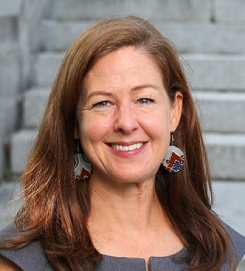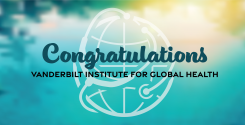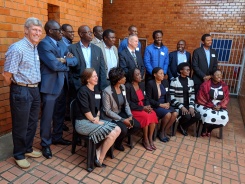VIGH Team Presents at 2025 CUGH Conference
March 7, 2025
In February, the Consortium of Universities for Global Health (CUGH) held its 2025 annual international conference in Atlanta, Georgia. Founded in 2008, CUGH has a mission to empower academic institutions and partners to tackle global health challenges and ultimately transform health outcomes worldwide. The organization aims to enhance the well-being of individuals and the planet through education, research, service, and advocacy. The event was co-sponsored by the Vanderbilt Institute for Global Health (VIGH).
VIGH hosts workshop on best practices in teaching methods and mentorship
May 18, 2023
Focusing on strengthening master’s level courses and programs at Bayero University Kano (BUK) in Nigeria, a team from the Vanderbilt Institute for Global Health developed a two-week intensive course on theories and best practices in teaching methods and mentorship. The course, “Improving Didactic Educational Approaches to Learning Methods” (IDEAL), was developed by Chase Stober, Elizabeth Rose, EdD, MPH, Marie Martin, PhD, MEd, and Megan Davis.
Academic Global Health Programs: How Were They Affected by the Pandemic?
December 2, 2022
Elizabeth Rose, EdD, MPH, MEd, and colleagues, recently published their study, “COVID-19 Pandemic Impact on Academic Global Health Programs: Results of a Large International Survey,” in Annals of Global Health (volume 88, issue 1).
VIGH well-represented at annual global health international conference
March 28, 2022
Seven groups of Vanderbilt Institute for Global Health (VIGH) faculty, staff, and trainees will present at the annual international conference of the Consortium of Universities for Global Health (CUGH). Established in 2008 with a mission focused on empowering academic institutions and other partners to address global health challenges and ultimately transform global health, CUGH works to improve the well-being of people and the planet through education, research, service, and advocacy.
The Vanderbilt Institute for Global Health Student Advisory Council Host Virtual Competition and Symposium
Elizabeth Rose
June 24, 2021
The Vanderbilt Institute for Global Health Student Advisory Council (SAC) is a student-led organization that brings together diverse students interested in global health with the goal of fostering cross-disciplinary student networking and collaboration. Although networking and collaboration often occur in person, this year, council leaders pivoted two key events to be held online. They welcomed a record attendance of Vanderbilt students, staff, faculty, and community members engaged in global health.
Mentor Training Program in Zambia Continues to Strengthen Mentorship Among University Faculty
Elizabeth Rose
May 25, 2021
In academia, mentors can provide valuable support and guidance to students in their professional and personal development. However, often mentors do not receive training in theories and practical strategies that could improve their mentorship. Faculty leaders at the University of Zambia (UNZA) are changing this trend to offer training in mentorship theory and effective techniques for faculty in masters and doctoral programs.
Developing Academic Leadership: A Faculty Professional Development Program in Zambia
Elizabeth Rose and Lorely Chávez
May 25, 2021
Current and future faculty leaders at the University of Zambia (UNZA) and Mulungushi University are benefitting from a training program that promotes effective leadership and management in education and healthcare by guiding trainees to strengthen their competencies in effectively leading teams. The Strengthening Health Professional Workforce Education Programs for Improved Quality Health Care in Zambia (SHEPIZ) Leadership and Management Program was developed by faculty and students from UNZA, Mulungushi University, and the Vanderbilt Institute for Global Health (VIGH). Drs.
2021 Global Health Graduates
May 13, 2021
Congratulations to the Class of 2021! We celebrate this year's Master of Public Health, Global Health Track students and recipients of the Graduate Certificate in Global Health.
Class of 2021 Global Health MPH and Certificate Graduates
Training the Trainers in Ethiopia
Elizabeth Rose and Lorely Chávez
April 28, 2021
Effective teaching, mentorship, and leadership skills are essential for faculty success in academic medicine, but these skills are rarely taught in medical school and residency training programs, particularly in low-resource settings. To address this gap among anesthesia educators in Ethiopia, a 13-week course was developed and piloted in a virtual platform from September 2020-January 2021.
Vanderbilt Lab Donation Supports Medical Education in Liberia
At the end of March, the Vanderbilt Institute for Global Health received a long-awaited message from Liberia – the 40-foot shipping container of medical books and other laboratory equipment donated by the Vanderbilt School of Medicine had survived it’s journey across the ocean and arrived at its final destination, the University of Liberia. The letter signaled the end of a nearly year-long donation effort at Vanderbilt and the beginning of new opportunities for current and future medical students in Liberia.
Why Mentorship Matters in Low- and Middle-Income Countries
May 17, 2019
"Mentors are teachers but not all teachers are mentors."
Lackson Kasonka, Senior Mentor
The next generation of global health researchers, scientists and practitioners are benefiting from a mentoring program at the University of Zambia (UNZA) in Lusaka with the help of colleagues from the Vanderbilt Institute for Global Health (VIGH) and the University of North Carolina at Chapel Hill, with support from the Fogarty International Center.



